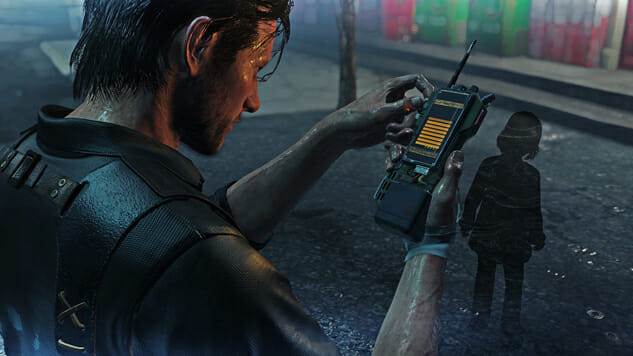
Is it just me, or is Sebastian Castellanos a really bad dad?
OK, scratch that. He’s not a bad dad. After all, he did sign up for a hellish descent into a psychological nightmare to combat a serial killer to save his daughter.
But beyond that, let’s talk about a big problem in videogames: flimsy character motivation.
I suppose it’s a bit silly to ask that The Evil Within 2 be more than what it is: a sophomore effort from a relatively new studio that is still finding its footing. The dialogue is weak, the plot devices laughably cliche, and the gameplay bland and conventional. Like many Japanese horror games looming in the imposing shadows of Resident Evil and Silent Hill, it pursues a fascination with American detective shows, but fails to put a fresh mark on the genre. If not for its competent use of disturbing imagery, The Evil Within 2 would be entirely forgettable, another trope-chaser on the market just in time for Halloween.
Nonetheless, as I think more about being a parent and what that role means to me in virtual entertainment, I’m starting to find that few videogames get it right. Like many action-based dramas, the character’s motivations are often an afterthought, shoehorned around the protagonist’s need for forward momentum, instead of writing the progression around their personal goals.
So as I play The Evil Within 2 and Sebastian stumbles around Union, blindly groping for clues and screaming “Lily!” every once in awhile, I just don’t buy it. At one point, when confronting her kidnapper, he literally asks, “Where’s the girl?” as if Lily were a person of no particular importance instead of his own flesh and blood. Translation issues and Liam Neeson-inspired delusions of grandeur aside, Sebastian seems wildly detached from the entire process, even as he pays lip service to the idea of Lily’s safety. In one flashback, you hear him “comfort” his wife, who claims that Lily was taken by a group of cultists, in a disturbingly unaffected tone, telling her that their daughter is gone now and nothing will change that. What memories we are shown of Lily are brief, almost shallow, and never does he reflect on what his life was like as her caregiver. For a bereaved father, he certainly seems comfortable with his daughter’s demise.
Reading too much into the writing (and a perhaps weak vocal performance), I could say that it’s a byproduct of the two cultures, Japanese and American, that created it: men aren’t particularly allowed to express the emotional vulnerability that would illustrate a genuine and sincere concern for their child. At the same time, that’s what writing is supposed to be about: giving an idea or scenario some additional thought to anticipate what the characters might be thinking or going through. I feel as though Tango Gameworks didn’t contemplate what Sebastian’s inner thoughts, as a tortured and panicked father, might actually be like. So many fears go unexplored, fears that I myself as a single mother often felt on the nights apart from my own daughter. Is she safe, is she well, is she fed, is she warm? Does she know that she is loved? How could Sebastian spend even a moment apart from Lily and not be sick and overwhelmed to the point of grief?
The answer is, it’s a videogame, and ultimately it’s not really about Sebastian’s daughter, it’s about giving him an excuse to run through several levels of repetitive combat mechanics and calling it a day. Sebastian’s relationship with Lily was never meant to resemble a sincere parental bond. Nonetheless, I see a missed opportunity. Of all the fathers in videogames, I can think of few that have actually exhibited a paternal warmth towards their children; most serve as plot devices or a clumsy means to illustrate the protagonist’s personal growth. What I want is a lead character whose motivations actually means something. Show me the risk, the vulnerability, the fear, the heartache. Give me a father who is not just brave enough to protect their child’s fragility but to extend their own as well.
Show me a father figure who is a real dad.
Holly Green is the assistant editor of Paste Games and a reporter and semiprofessional photographer. She is also the author of Fry Scores: An Unofficial Guide To Video Game Grub. You can find her work at Gamasutra, Polygon, Unwinnable, and other videogame news publications.
